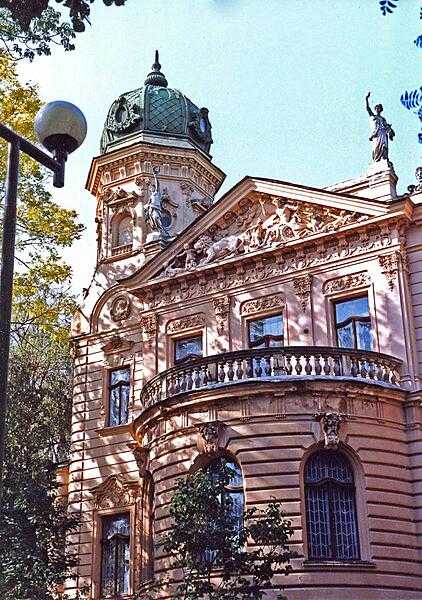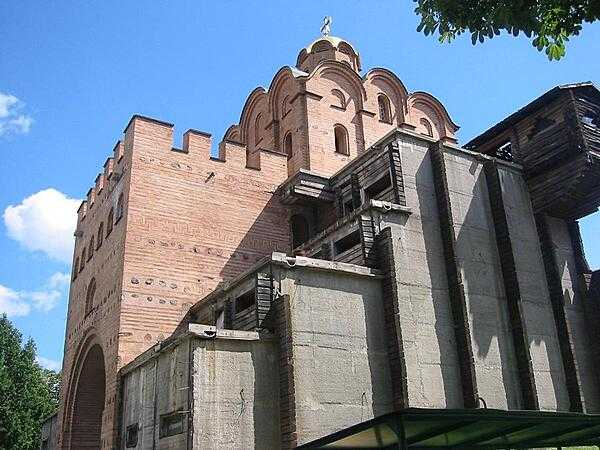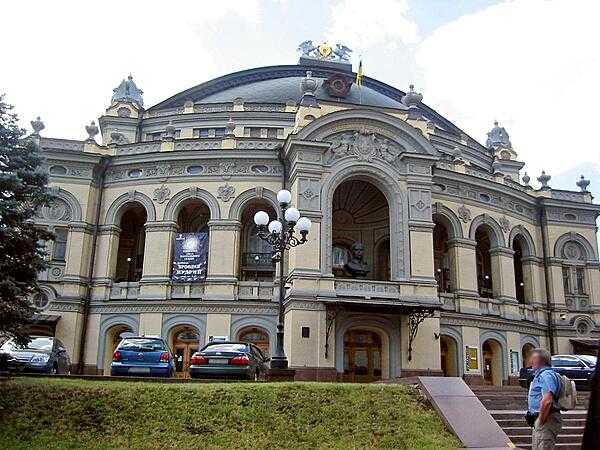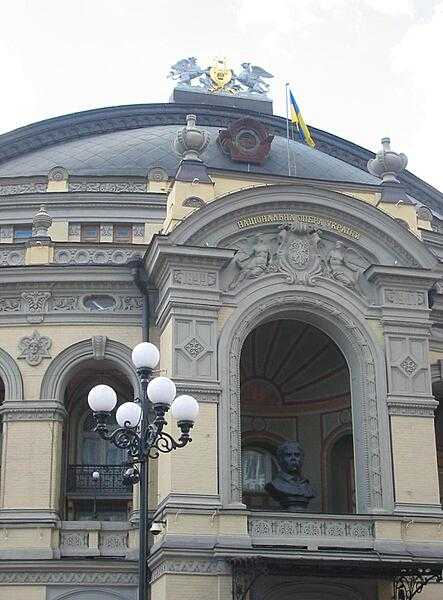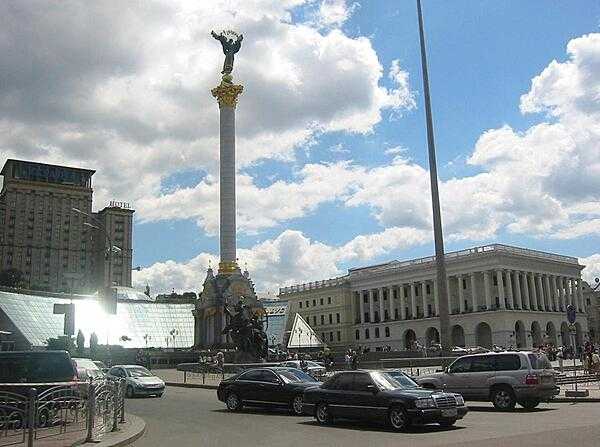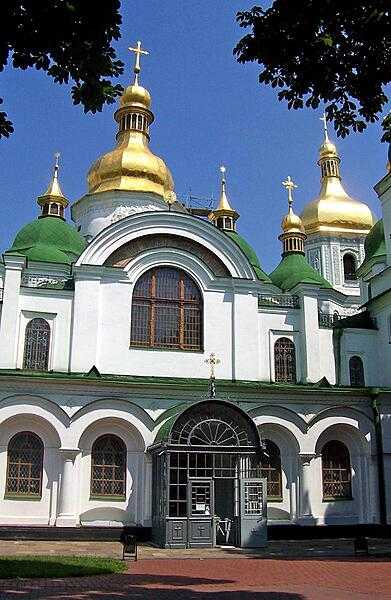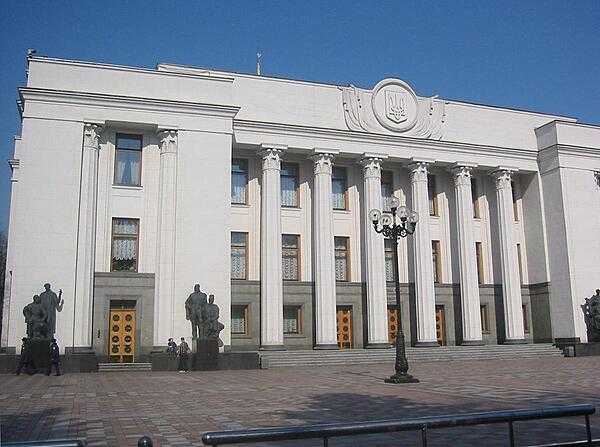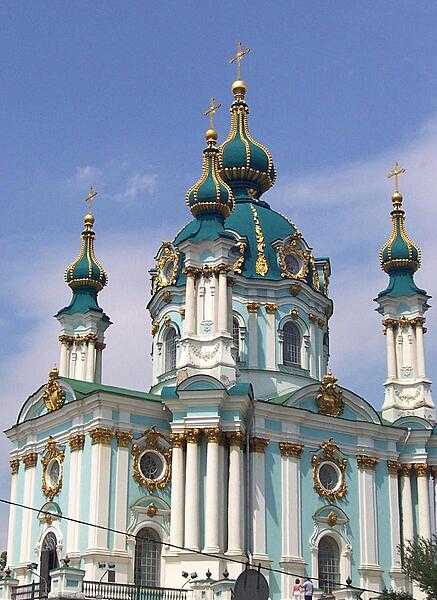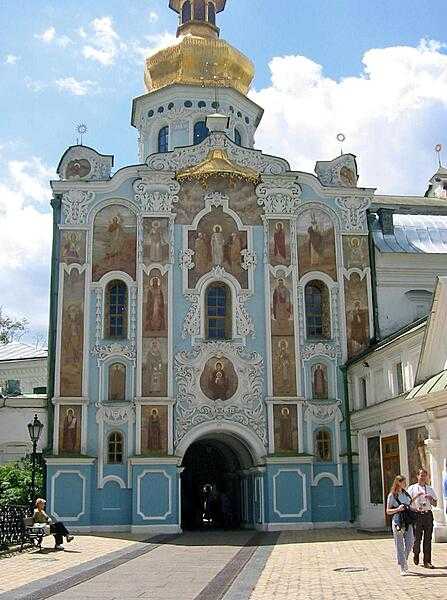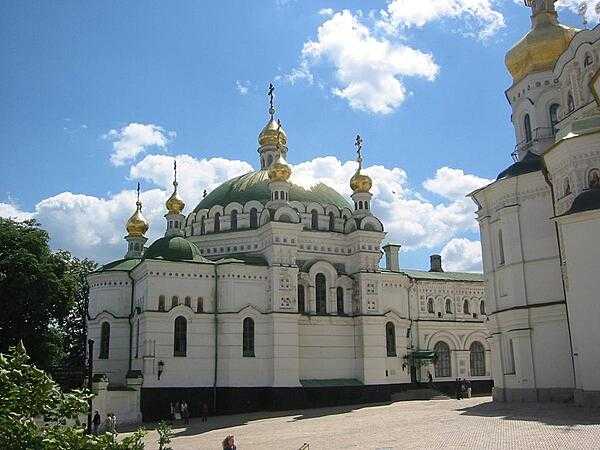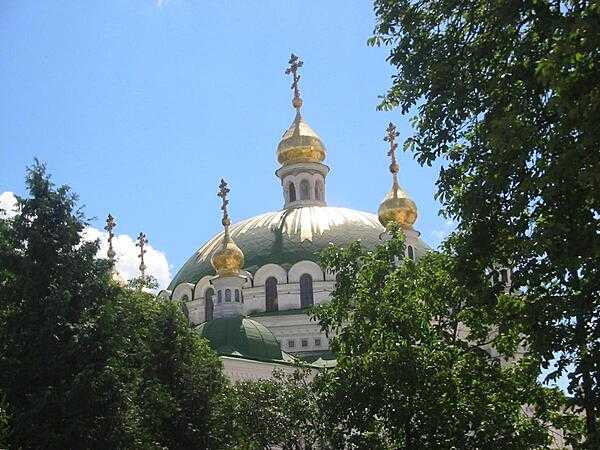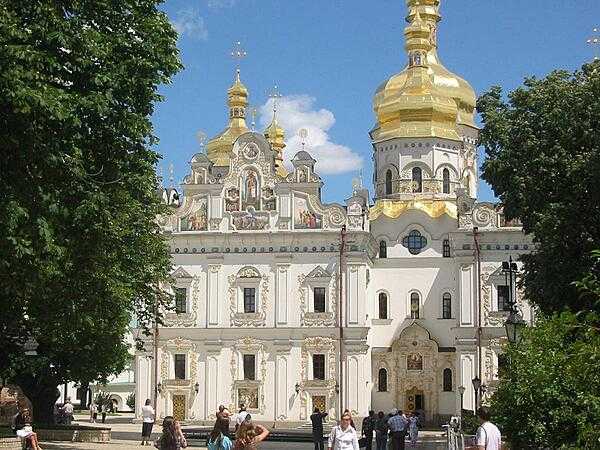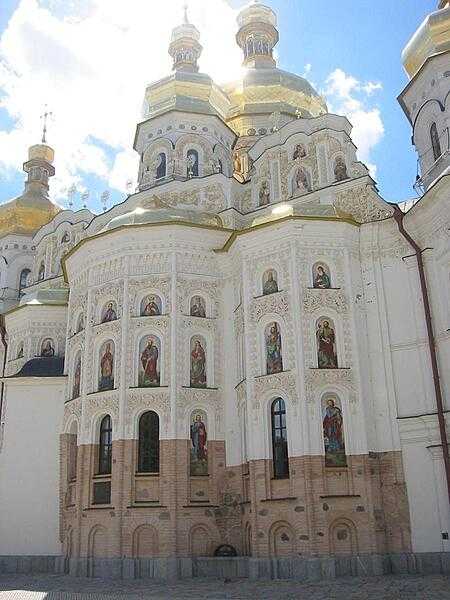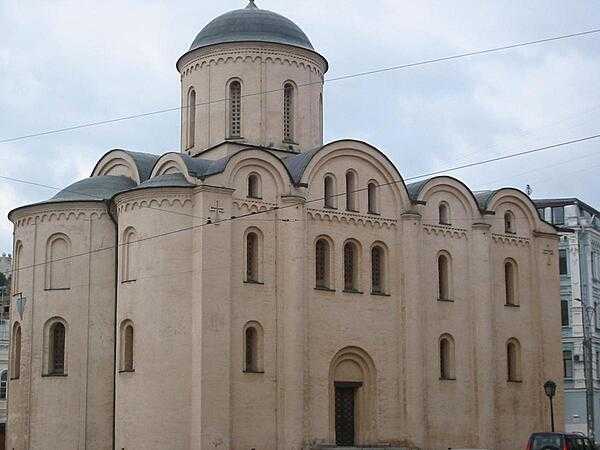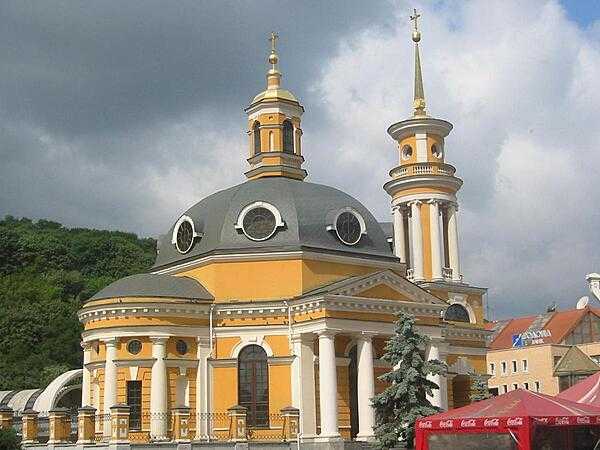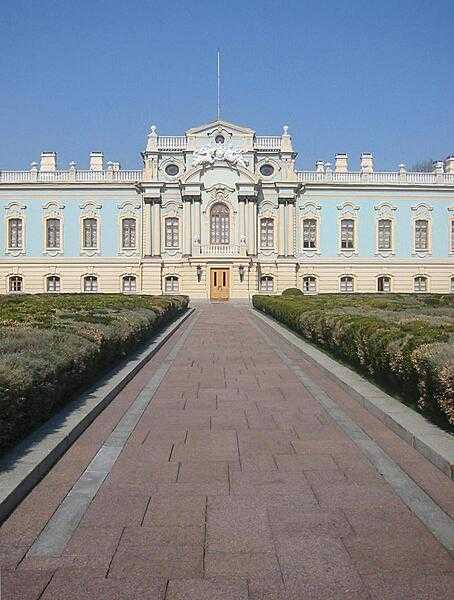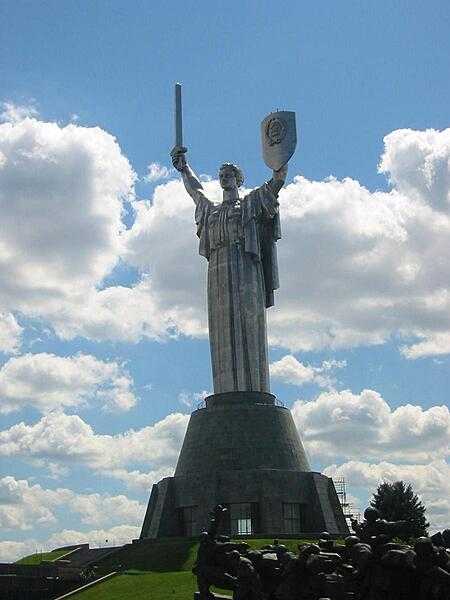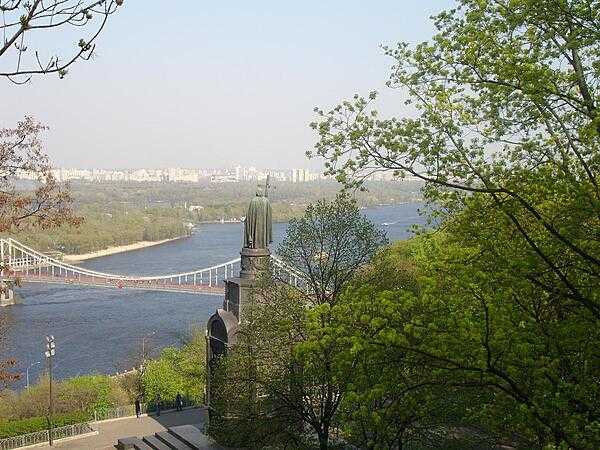Ukraine - UA - UKR - UKR - Europe
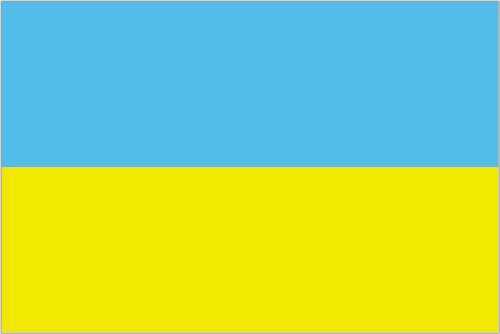
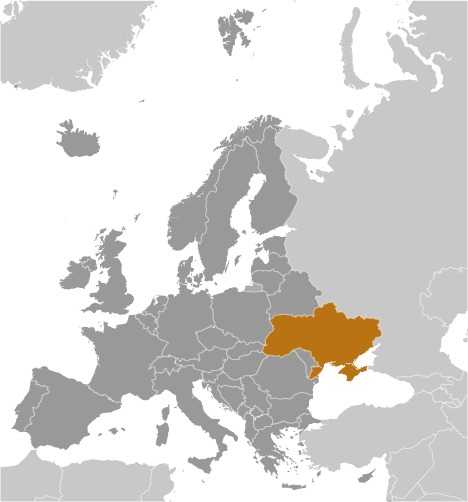
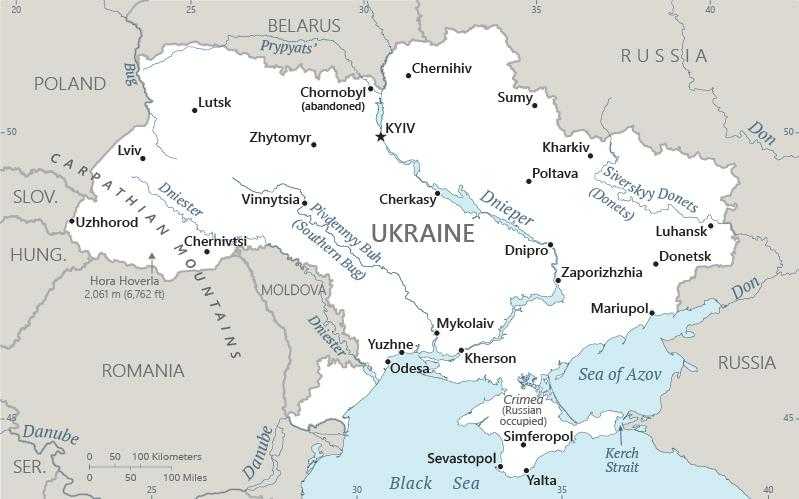
Ukraine Images
Ukraine Factbook Data
Diplomatic representation from the US
embassy: 4 A. I. Igor Sikorsky Street, 04112 Kyiv
mailing address: 5850 Kyiv Place, Washington, DC 20521-5850
telephone: [380] (44) 521-5000
FAX: [380] (44) 521-5544
email address and website:
kyivacs@state.gov
https://ua.usembassy.gov/
Age structure
15-64 years: 67.8% (male 12,784,928/female 11,376,460)
65 years and over: 19.9% (2024 est.) (male 2,447,105/female 4,652,717)
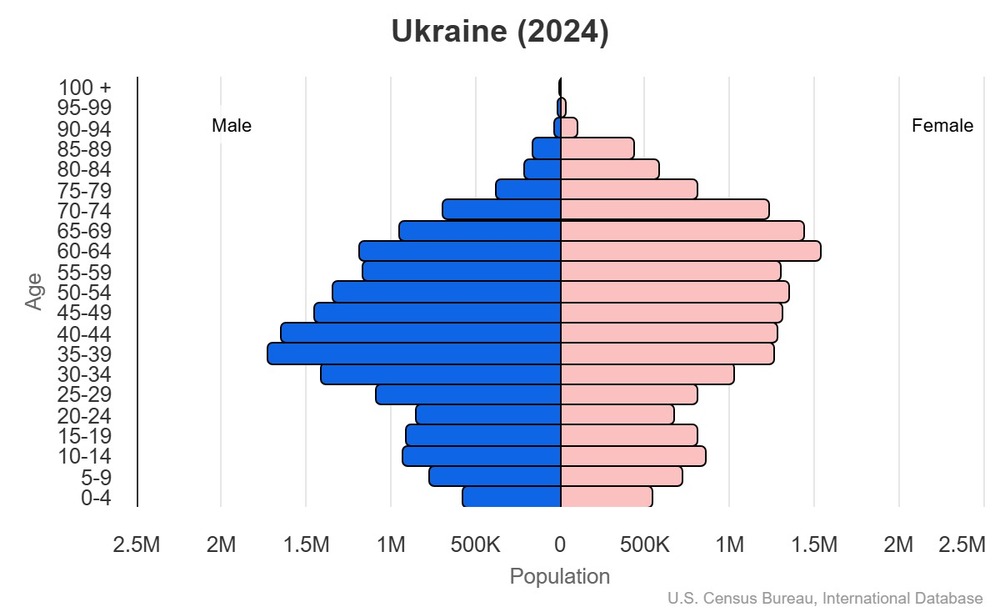
For additional information, please see the entry for Population pyramid on the Definitions and Notes page.
Geographic coordinates
Sex ratio
0-14 years: 1.07 male(s)/female
15-64 years: 1.12 male(s)/female
65 years and over: 0.53 male(s)/female
total population: 0.97 male(s)/female (2024 est.)
Natural hazards
Area - comparative
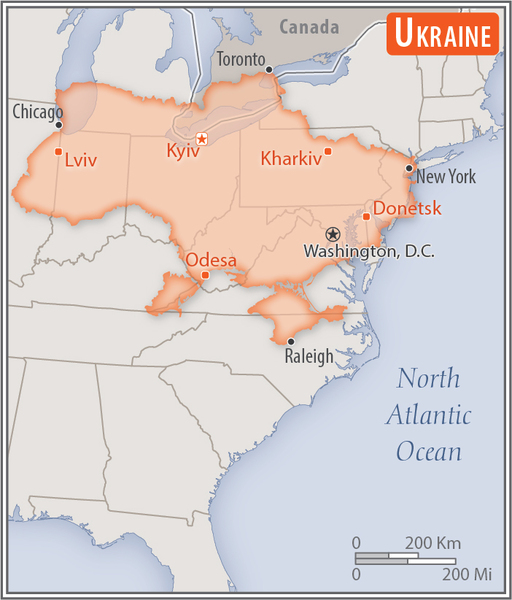
Military service age and obligation
note 1: conscription was abolished in 2012, but reintroduced in 2014; following the Russian invasion in 2022, all non-exempt men ages 18-60 were required to register with their local recruitment offices and undergo medical screening for possible service; the Territorial Defense Forces accept volunteers, 18-60 years of age
note 2: in February 2025, the military implemented a new option for volunteers age 18-24 to sign one-year contracts in return for higher wages, a signing bonus, exemption from mobilization for 12 months, and other social benefits
note 3: women have been able to volunteer for military service since 1993; as of 2024, nearly 70,000 women were serving in the armed forces in both uniformed and civilian positions
note 4: since 2015, the Ukrainian military has allowed foreigners and stateless persons, 18-45 (in special cases up to 60), to join on 3-5-year contracts, based on qualifications; following the 2022 Russian invasion, the military began accepting medically fit foreign volunteers on a larger scale into an International Legion
Background
Ukraine was the center of the first eastern Slavic state, Kyivan Rus, which was the largest and most powerful state in Europe during the 10th and 11th centuries. Weakened by internecine quarrels and Mongol invasions, Kyivan Rus was incorporated into the Grand Duchy of Lithuania and eventually into the Polish-Lithuanian Commonwealth. The cultural and religious legacy of Kyivan Rus laid the foundation for Ukrainian nationalism. A new Ukrainian state, the Cossack Hetmanate, was established during the mid-17th century after an uprising against the Poles. Despite continuous Muscovite pressure, the Hetmanate managed to remain autonomous for well over 100 years. During the latter part of the 18th century, the Russian Empire absorbed most Ukrainian territory. After czarist Russia collapsed in 1917, Ukraine -- which has long been known as the region's "bread basket" for its agricultural production -- achieved a short-lived period of independence (1917-20), but the country was reconquered and endured a Soviet rule that engineered two famines (1921-22 and 1932-33) in which over eight million died. In World War II, German and Soviet armies were responsible for seven to eight million more deaths. In 1986, a sudden power surge during a reactor-systems test at Ukraine's Chernobyl power station triggered the worst nuclear disaster in history, releasing massive amounts of radioactive material. Although Ukraine overwhelmingly voted for independence in 1991 as the Union of Soviet Socialist Republics (USSR) dissolved, democracy and prosperity remained elusive, with the legacy of state control, patronage politics, and endemic corruption stalling efforts at economic reform, privatization, and civil liberties.
In 2004 and 2005, a mass protest dubbed the "Orange Revolution" forced the authorities to overturn a presidential election and allow a new internationally monitored vote that swept into power a reformist slate under Viktor YUSHCHENKO. Rival Viktor YANUKOVYCH became prime minister in 2006 and was elected president in 2010. In 2012, Ukraine held legislative elections that Western observers widely criticized as corrupt. In 2013, YANUKOVYCH backtracked on a trade and cooperation agreement with the EU -- in favor of closer economic ties with Russia -- and then used force against protestors who supported the agreement, leading to a three-month protestor occupation of Kyiv's central square. The government's use of violence to break up the protest camp in 2014 led to multiple deaths, international condemnation, a failed political deal, and the president's abrupt departure for Russia. Pro-West President Petro POROSHENKO took office later that year; Volodymyr ZELENSKYY succeeded him in 2019.
Shortly after YANUKOVYCH's departure in 2014, Russian President Vladimir PUTIN ordered the invasion of Ukraine's Crimean Peninsula. In response, the UN passed a resolution confirming Ukraine's sovereignty and independence. In mid-2014, Russia began an armed conflict in two of Ukraine's eastern provinces. International efforts to end the conflict failed, and by 2022, more than 14,000 civilians were killed or wounded. On 24 February 2022, Russia escalated the conflict by invading the country on several fronts, in what has become the largest conventional military attack on a sovereign state in Europe since World War II. Russia made substantial gains in the early weeks of the invasion but underestimated Ukrainian resolve and combat capabilities. Despite Ukrainian resistance, Russia has laid claim to four Ukrainian oblasts -- Donetsk, Kherson, Luhansk, and Zaporizhzhia -- although none is fully under Russian control. The international community has not recognized the annexations. The invasion has also created Europe's largest refugee crisis since World War II, with over six million Ukrainian refugees recorded globally. It remains one of the two largest displacement crises worldwide (the other is the conflict in Syria). President ZELENSKYY has focused on boosting Ukrainian identity to unite the country behind the goals of ending the war through reclaiming territory and advancing Ukraine’s candidacy for EU membership.
Environmental issues
International environmental agreements
signed, but not ratified: Air Pollution-Heavy Metals, Air Pollution-Persistent Organic Pollutants, Air Pollution-Sulfur 94, Air Pollution-Volatile Organic Compounds
Military expenditures
4.4% of GDP (2020 est.)
3.4% of GDP (2019 est.)
3.1% of GDP (2018 est.)
3.1% of GDP (2017 est.)
note: since Russia's invasion of the country in early 2022, annual defense spending has increased to more than 30% of GDP according to some estimates
Population below poverty line
note: % of population with income below national poverty line
Household income or consumption by percentage share
highest 10%: 21.7% (2020 est.)
note: % share of income accruing to lowest and highest 10% of population
Exports - commodities
note: top five export commodities based on value in dollars
Exports - partners
note: top five export partners based on percentage share of exports
Administrative divisions
note 1: administrative divisions have the same names as their administrative centers; exceptions show the administrative center name in parentheses
note 2: the United States does not recognize Russia's annexation or renaming of Ukraine's Autonomous Republic of Crimea and the municipality of Sevastopol; it similarly does not recognize the annexation of the Ukrainian oblasts Donetsk, Luhansk, Zaporizhzhia, and Kherson
Agricultural products
note: top ten agricultural products based on tonnage
Military and security forces
Ministry of Internal Affairs: National Guard of Ukraine, State Border Guard Service of Ukraine (includes Maritime Border Guard or Sea Guard), National Police of Ukraine (2025)
note 1: combat units of the National Guard, National Police, and Border Guards come under the control of the Armed Forces in wartime.
note 2: the Territorial Defense Forces (TDF) were formally established in July 2021; the TDF evolved from former Territorial Defense Battalions and other volunteer militia and paramilitary units that were organized in 2014-2015 to fight Russian-backed separatists in the Donbas; in January 2022, the TDF was activated as a separate military branch
note 3: collectively, the AFU and the forces under the Ministry of Interior are known as the Defense Forces of Ukraine (DFU)
Budget
expenditures: $121.657 billion (2023 est.)
note: central government revenues (excluding grants) and expenditures converted to US dollars at average official exchange rate for year indicated
Capital
geographic coordinates: 50 26 N, 30 31 E
time difference: UTC+2 (7 hours ahead of Washington, DC, during Standard Time)
daylight saving time: +1hr, begins last Sunday in March; ends last Sunday in October
etymology: the origin of the name is unclear; traditionally, the name comes from a Prince Kiy, who is said to have founded the city in the 9th century
Imports - commodities
note: top five import commodities based on value in dollars
Climate
Coastline
Constitution
amendment process: proposed by the president of Ukraine or by at least one third of the Supreme Council members; adoption requires simple majority vote by the Council and at least two-thirds majority vote in its next regular session; adoption of proposals relating to general constitutional principles, elections, and amendment procedures requires two-thirds majority vote by the Council and approval in a referendum; constitutional articles on personal rights and freedoms, national independence, and territorial integrity cannot be amended
Exchange rates
Exchange rates:
40.152 (2024 est.)
36.574 (2023 est.)
32.342 (2022 est.)
27.286 (2021 est.)
26.958 (2020 est.)
Executive branch
head of government: Prime Minister Yulia SVYRYDENKO (since 17 July 2025)
cabinet: Cabinet of Ministers nominated by the prime minister, approved by the Verkhovna Rada
election/appointment process: president directly elected by absolute-majority popular vote in 2 rounds, if needed, for a 5-year term (eligible for a second term); prime minister selected by the Verkhovna Rada
most recent election date: 31 March and 21 April 2019
election results:
2019: Volodymyr ZELENSKYY elected president in second round; percent of vote in first round - Volodymyr ZELENSKYY (Servant of the People) 30.2%, Petro POROSHENKO (BPP-Solidarity) 15.6%, Yuliya TYMOSHENKO (Fatherland) 13.4%, Yuriy BOYKO (Opposition Platform-For Life) 11.7%, 35 other candidates 29.1%; percent of vote in the second round - Volodymyr ZELENSKYY 73.2%, Petro POROSHENKO 24.5%, other 2.3%; Denys SHMYHAL (independent) elected prime minister; Verkhovna Rada vote - 291-59
2014: Petro POROSHENKO elected president in first round; percent of vote - Petro POROSHENKO (independent) 54.5%, Yuliya TYMOSHENKO (Fatherland) 12.9%, Oleh LYASHKO (Radical Party) 8.4%, other 24.2%; Volodymyr HROYSMAN (BPP) elected prime minister; Verkhovna Rada vote - 257-50
expected date of next election: scheduled for March/April 2024, but not held because Ukraine has been under martial law since February 2022
note: a National Security and Defense Council or NSDC was created in 1992 and tasked with developing national security policy on domestic and international matters and advising the president; a presidential administration helps draft presidential edicts and provides policy support to the president
Flag
meaning: the colors date back to medieval heraldry, but they are sometimes said to represent grain fields under a blue sky
Independence
Industries
Judicial branch
judge selection and term of office: Supreme Court judges recommended by the High Qualification Commission of Judges (a 16-member state body responsible for judicial candidate testing and assessment and judicial administration), submitted to the High Council of Justice, a 21-member independent body of judicial officials; judges serve until mandatory retirement at age 65; High Anti-Corruption Court judges are selected by the same process, with one addition – a majority of a combined High Qualification Commission of Judges and a 6-member Public Council of International Experts must vote in favor of potential judges in order to recommend their nomination to the High Council of Justice; Constitutional Court justices appointed - 6 each by the president, the Congress of Judges, and the Verkhovna Rada; judges serve 9-year nonrenewable terms
subordinate courts: Courts of Appeal; district courts
Land boundaries
border countries (6): Belarus 1,111 km; Hungary 128 km; Moldova 1,202 km; Poland 498 km; Romania 601 km; Russia 1,944 km, Slovakia 97 km
Land use
arable land: 56.8% (2023 est.)
permanent crops: 1.5% (2023 est.)
permanent pasture: 13% (2023 est.)
forest: 17.3% (2023 est.)
other: 10.4% (2023 est.)
Legal system
Legislative branch
legislative structure: unicameral
number of seats: 450 (all directly elected)
electoral system: mixed system
scope of elections: full renewal
term in office: 5 years
most recent election date: 7/21/2019
parties elected and seats per party: Servant of the People (254); Opposition Platform - For Life (43); Fatherland (26); European Solidarity (25); Independents (46); Other (30)
percentage of women in chamber: 21.2%
expected date of next election: May 2025
note 1: the next legislative election is expected to take place after the Russian-Ukrainian War ends
note 2: voting not held in Crimea and parts of two Russian-occupied eastern oblasts leaving 26 seats vacant; although this brings the total to 424 elected members (of 450 potential), article 83 of the constitution mandates that a parliamentary majority consists of 226 seats
Literacy
male: 100%
female: 100% (2021)
Maritime claims
exclusive economic zone: 200 nm
continental shelf: 200 m or to the depth of exploitation
International organization participation
note: Ukraine is an EU candidate country and must complete accession criteria before being granted full membership
National holiday
note: 22 January 1918, the day Ukraine first declared its independence from Soviet Russia, is now celebrated as Unity Day
Nationality
adjective: Ukrainian
Natural resources
Geography - note
Economic overview
lower-middle-income, non-EU, Eastern European economy; key wheat and corn exporter; gradual recovery after 30% GDP contraction at start of war; damage to infrastructure and agriculture balanced by consumer and business resilience in western Ukraine; international aid has stabilized foreign exchange reserves, allowing managed currency float; continued progress on anti-corruption reforms
Political parties
Fatherland or VOB
Holos
Servant of the People or SN
Railways
standard gauge: 49 km (2014) 1.435-m gauge (49 km electrified)
broad gauge: 21,684 km (2014) 1.524-m gauge (9,250 km electrified)
Suffrage
Terrain
Government type
Country name
conventional short form: Ukraine
local long form: none
local short form: Ukraina
former: Ukrainian National Republic, Ukrainian State, Ukrainian Soviet Socialist Republic
etymology: the name derives from the Old East Slavic or Old Russian word ukraina, meaning "borderland," which was used to describe the area on medieval Russia's border at the time of the Tatar invasion in the 13th century
Location
Map references
Irrigated land
Diplomatic representation in the US
chancery: 3350 M Street NW, Washington, DC 20007
telephone: [1] (202) 349-2963
FAX: [1] (202) 333-0817
email address and website:
emb_us@mfa.gov.ua
https://usa.mfa.gov.ua/en
consulate(s) general: Chicago, New York, San Francisco
Internet users
Internet country code
Refugees and internally displaced persons
IDPs: 3,665,165 (2024 est.)
stateless persons: 10,910 (2024 est.)
GDP (official exchange rate)
note: data in current dollars at official exchange rate
Total renewable water resources
School life expectancy (primary to tertiary education)
male: 13 years (2021 est.)
female: 14 years (2021 est.)
Urbanization
rate of urbanization: -0.27% annual rate of change (2020-25 est.)
Broadcast media
Drinking water source
urban: 90.8% of population (2022 est.)
rural: 100% of population (2022 est.)
total: 93.6% of population (2022 est.)
unimproved:
urban: 9.2% of population (2022 est.)
rural: 0% of population (2022 est.)
total: 6.4% of population (2022 est.)
National anthem(s)
lyrics/music: Paul CHUBYNSKYI/Mikhail VERBYTSKYI
history: music adopted 1991, lyrics adopted 2003; current version of the anthem is the first verse of CHUBYNSKYI's poem, plus the chorus
Major urban areas - population
International law organization participation
Physician density
Hospital bed density
National symbol(s)
Mother's mean age at first birth
GDP - composition, by end use
government consumption: 37.9% (2024 est.)
investment in fixed capital: 18.9% (2024 est.)
investment in inventories: -0.3% (2024 est.)
exports of goods and services: 29.4% (2024 est.)
imports of goods and services: -48.3% (2024 est.)
note: figures may not total 100% due to rounding or gaps in data collection
Dependency ratios
youth dependency ratio: 18.2 (2024 est.)
elderly dependency ratio: 29.4 (2024 est.)
potential support ratio: 3.4 (2024 est.)
note: data include Crimea
Citizenship
citizenship by descent only: at least one parent must be a citizen of Ukraine
dual citizenship recognized: no
residency requirement for naturalization: 5 years
Population distribution
note: the ongoing war with Russia has shifted significant portions of the population, particularly in the east
Electricity access
Civil aircraft registration country code prefix
Sanitation facility access
urban: 100% of population (2022 est.)
rural: 100% of population (2022 est.)
total: 100% of population (2022 est.)
unimproved:
urban: 0% of population (2022 est.)
rural: 0% of population (2022 est.)
total: 0% of population (2022 est.)
Ethnic groups
Religions
note: Ukraine's population is overwhelmingly Christian; the vast majority - up to two thirds - identify themselves as Orthodox, but many do not specify a particular branch; the OCU and the UOC-MP each represent less than a quarter of the country's population, the Ukrainian Greek Catholic Church accounts for 8-10%, and the UAOC accounts for 1-2%; Muslim and Jewish adherents each compose less than 1% of the total population
Languages
major-language sample(s):
Свiтова Книга Фактiв – найкраще джерело базової інформації. (Ukrainian)
The World Factbook, the indispensable source for basic information.
Imports - partners
note: top five import partners based on percentage share of imports
Elevation
lowest point: Black Sea 0 m
mean elevation: 175 m
Health expenditure
10.6% of national budget (2021 est.)
Military - note
Ukraine has a relationship with NATO dating back to the early 1990s, when Ukraine joined the North Atlantic Cooperation Council (1991) and the Partnership for Peace program (1994); the relationship intensified in the wake of the 2014 Russia-Ukraine conflict and Russian seizure of Crimea to include NATO support for Ukrainian military capabilities development and capacity-building; NATO and individual NATO countries further increased support to the Ukrainian military following Russia’s 2022 invasion (2025)
Military and security service personnel strengths
note: following the Russian invasion of Ukraine in February 2022, President ZELENSKY announced a general mobilization of the country; prior to the invasion, Ukraine had approximately 200,000 active Armed Forces troops, approximately 50,000 National Guard, and approximately 40,000 State Border Guard
Military deployments
Total water withdrawal
industrial: 2.188 billion cubic meters (2022)
agricultural: 1.031 billion cubic meters (2022)
Waste and recycling
percent of municipal solid waste recycled: 4.5% (2022 est.)
Average household expenditures
on alcohol and tobacco: 6.9% of household expenditures (2023 est.)
Major watersheds (area sq km)
Major rivers (by length in km)
note: [s] after country name indicates river source; [m] after country name indicates river mouth
National heritage
selected World Heritage Site locales: Kyiv: Saint Sophia Cathedral and Related Monastic Buildings, Kyiv Pechersk Lavra (c); Lviv Historic Center (c); Residence of Bukovinian and Dalmatian Metropolitans, Chernivtsi (c); Ancient City of Tauric Chersonese, Sevastopol (c); Wooden Tserkvas of the Carpathian Region (c); Ancient and Primeval Beech Forests of the Carpathians (n); Struve Geodetic Arc (c); The Historic Centre of Odesa (c)
Coal
consumption: 25.012 million metric tons (2023 est.)
exports: 32,000 metric tons (2023 est.)
imports: 5.442 million metric tons (2023 est.)
proven reserves: 34.375 billion metric tons (2023 est.)
Electricity generation sources
nuclear: 50.6% of total installed capacity (2023 est.)
solar: 4.5% of total installed capacity (2023 est.)
wind: 1% of total installed capacity (2023 est.)
hydroelectricity: 9.9% of total installed capacity (2023 est.)
biomass and waste: 1% of total installed capacity (2023 est.)
Natural gas
consumption: 19.705 billion cubic meters (2023 est.)
exports: 95.994 million cubic meters (2022 est.)
imports: 2.028 billion cubic meters (2023 est.)
proven reserves: 1.104 trillion cubic meters (2021 est.)
Petroleum
refined petroleum consumption: 192,000 bbl/day (2023 est.)
crude oil estimated reserves: 395 million barrels (2021 est.)
Remittances
8.3% of GDP (2023 est.)
10.4% of GDP (2022 est.)
note: personal transfers and compensation between resident and non-resident individuals/households/entities
Nuclear energy
Number of nuclear reactors under construction: 2 (2025)
Net capacity of operational nuclear reactors: 13.11GW (2025 est.)
Percent of total electricity production: 55% (2023 est.)
Number of nuclear reactors permanently shut down: 4 (2025)
Space program overview
note: Dnipro, known as Ukraine's “Rocket City,” was one of the Soviet Union’s main centers for space, nuclear, and military industries and played a crucial role in the development and manufacture of both civilian and military rockets
Space agency/agencies
Ports
large: 3
medium: 0
small: 8
very small: 15
ports with oil terminals: 8
key ports: Berdyansk, Dnipro-Buzkyy, Feodosiya, Illichivsk, Kerch, Kherson, Mariupol, Mykolayiv, Odesa, Sevastopol, Yuzhnyy
National color(s)
Particulate matter emissions
Methane emissions
agriculture: 341.6 kt (2019-2021 est.)
waste: 409.2 kt (2019-2021 est.)
other: 70.9 kt (2019-2021 est.)
Key space-program milestones
1997 - first Ukrainian astronaut in space on US Space Shuttle
1999 - first launch of Dnipro-1, a domestically produced satellite launch vehicle (SLV)
2008 - first launch of Zenit-3SLB, a domestically produced SLV
2014 - launched first domestically produced microsatellite (PolyITAN-1)
2020 - signed US-led Artemis Accords for space and lunar exploration
2021 - first successful launch of joint Ukrainian-US commercial light SLV (Alpha)
2022 - domestically produced RS microsatellite (Sich 2-30) launched by US
2024 - first Ukrainian woman to suborbital space on US commercial spacecraft
Labor force
note: number of people ages 15 or older who are employed or seeking work
Youth unemployment rate (ages 15-24)
male: 18.1% (2021 est.)
female: 20.4% (2021 est.)
note: % of labor force ages 15-24 seeking employment
Debt - external
note: present value of external debt in current US dollars
Maternal mortality ratio
Reserves of foreign exchange and gold
$40.51 billion (2023 est.)
$28.506 billion (2022 est.)
note: holdings of gold (year-end prices)/foreign exchange/special drawing rights in current dollars
Public debt
note: central government debt as a % of GDP
Unemployment rate
9.5% (2020 est.)
8.2% (2019 est.)
note: % of labor force seeking employment
Population
male: 17,510,149
female: 18,151,677
Carbon dioxide emissions
from coal and metallurgical coke: 45.512 million metric tonnes of CO2 (2023 est.)
from petroleum and other liquids: 24.488 million metric tonnes of CO2 (2023 est.)
from consumed natural gas: 36.847 million metric tonnes of CO2 (2023 est.)
Area
land: 579,330 sq km
water: 24,220 sq km
note: Russia annexed Crimea in 2014, an area of approximately 27,000 sq km (10,400 sq miles)
Taxes and other revenues
note: central government tax revenue as a % of GDP
Real GDP (purchasing power parity)
$561.23 billion (2023 est.)
$531.796 billion (2022 est.)
note: data in 2021 dollars
Airports
Gini Index coefficient - distribution of family income
note: index (0-100) of income distribution; higher values represent greater inequality
Inflation rate (consumer prices)
12.8% (2023 est.)
20.2% (2022 est.)
note: annual % change based on consumer prices
Current account balance
-$9.564 billion (2023 est.)
$7.976 billion (2022 est.)
note: balance of payments - net trade and primary/secondary income in current dollars
Real GDP per capita
$15,900 (2023 est.)
$13,800 (2022 est.)
note: data in 2021 dollars
Broadband - fixed subscriptions
subscriptions per 100 inhabitants: 20 (2023 est.)
Tobacco use
male: 35.5% (2025 est.)
female: 8% (2025 est.)
Obesity - adult prevalence rate
Energy consumption per capita
Electricity
consumption: 89.402 billion kWh (2023 est.)
exports: 6.1 billion kWh (2023 est.)
imports: 3.28 billion kWh (2023 est.)
transmission/distribution losses: 10.347 billion kWh (2023 est.)
Merchant marine
by type: container ship 1, general cargo 83, oil tanker 14, other 312
Imports
$89.159 billion (2023 est.)
$83.254 billion (2022 est.)
note: balance of payments - imports of goods and services in current dollars
Exports
$51.28 billion (2023 est.)
$57.517 billion (2022 est.)
note: balance of payments - exports of goods and services in current dollars
Heliports
Telephones - fixed lines
subscriptions per 100 inhabitants: 4 (2023 est.)
Alcohol consumption per capita
beer: 2.44 liters of pure alcohol (2019 est.)
wine: 0.32 liters of pure alcohol (2019 est.)
spirits: 2.88 liters of pure alcohol (2019 est.)
other alcohols: 0.05 liters of pure alcohol (2019 est.)
Life expectancy at birth
male: 65.4 years
female: 75.8 years
Real GDP growth rate
5.5% (2023 est.)
-28.8% (2022 est.)
note: annual GDP % growth based on constant local currency
Industrial production growth rate
note: annual % change in industrial value added based on constant local currency
GDP - composition, by sector of origin
industry: 19% (2024 est.)
services: 60.6% (2024 est.)
note: figures may not total 100% due to non-allocated consumption not captured in sector-reported data
Education expenditure
12.7% national budget (2021 est.)
Military equipment inventories and acquisitions
Gross reproduction rate
Net migration rate
Median age
male: 41.4 years
female: 49.2 years
Total fertility rate
Infant mortality rate
male: 9.7 deaths/1,000 live births
female: 7.6 deaths/1,000 live births
Telephones - mobile cellular
subscriptions per 100 inhabitants: 135 (2021 est.)
